Search the Special Collections and Archives Portal
Search Results

Nomination for Governor's Arts Award for Hyman Gold, 1986
Date
Archival Collection
Description
This nomination form for Hyman Gold to receive the Governor's Arts Award for Excellence in the Arts gives details about Gold's many musical accomplishments, as well as his service to the community.
Text
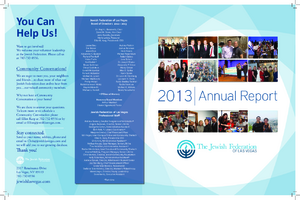
Annual Report of the Jewish Federation of Las Vegas, 2013
Date
Archival Collection
Description
Annual report from the Jewish Federation of Las Vegas for 2013.
Text
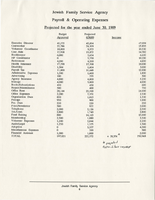
Orientation manual of the Jewish Family Service Agency of Clark County, 1989
Date
Archival Collection
Description
The orientation manual of the Jewish Family Service Agency provides guidance for the duties of the board of directors, the operation of the agency, the organization chart, and staff listing. It also outlines the role of volunteers in the agency.
Text
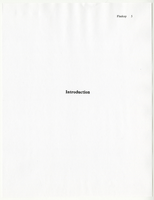
Jews Wandering in the Desert: A History of the Jewish Community of Las Vegas by Joel Fleekop, May 1, 2000
Date
Archival Collection
Description
Joel Fleekop's senior honors thesis from Brandeis University titled: "Jews Wandering in the Desert: A History of the Jewish Community of Las Vegas."
Text
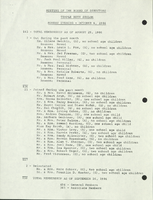
Minutes from Temple Beth Sholom Board of Directors meetings, June 1987 - May 1988 (2 of 2)
Date
Archival Collection
Description
Meeting minutes include reports from committees of the board, correspondence, and balance sheets.
Text
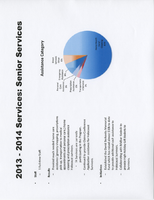
Overview of Jewish Family Service Agency operations, 2013-2014
Date
Archival Collection
Description
This document contains graphs and charts to document the services provided to the community by the Jewish Family Service Agency in 2013 and 2014.
Text

Transcript of an interview with Gertrude Rudiak, Richard Rudiak, and Dani Ramage by Barbara Tabach, December 30, 2015
Date
Archival Collection
Description
On December 30, 2015, a few months after her 100th birthday celebration, Gertrude Rudiak, with the help of her son Richard Rudiak and granddaughter Dani Ramage, reminisced about living in Las Vegas since 1946, nearly eighty years. They explore the ancestral roots of Gertrude (n?e Rightman) and of her deceased husband George Rudiak. Their courtship and marriage at the brink of World War II and George?s enlistment in the US Army Corps is what brought the couple to Las Vegas and the gunnery school which is now Nellis Air Force Base. After his tour of duty, George settled into a law practice where he specialized in quickie-divorces, but also carved out a reputation supporting civil rights and working for legislation to eliminate working and living discrimination of blacks in Nevada. Gertrude was an active member of Las Vegas. She played the pipe organ, hosted large Seders at Passover and managed the Rudiak household that grew to include five children. Over her long life, Gertrude embraced many positions on community boards, including being Temple Beth Sholom?s first female board member. She was also a teacher in both secular and Jewish education. Her efforts have been recognized by the Jewish National Fund, the United Jewish Appeal, and the Anti-Defamation League. Additionally, Mayor Carolyn Goodman presented Gertrude with the distinguished honor of a key to the city of Las Vegas in 2014. The city declared August 2, Gertrude's birthday, Gertrude Rudiak Day in recognition of her long-standing commitment to Las Vegas.
Text
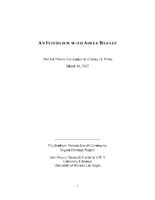
Transcript of interview with Adele Baratz by Claytee D. White, March 19, 2007
Date
Archival Collection
Description
Interview with Adele Baratz by Claytee White on March 19, 2007. In this interview, Baratz talks about her parents who came to the United States as teenagers from Russia and eventually settled in Las Vegas after a short time in California. She discusses the Jewish community in Las Vegas when she was growing up, and her father's job selling bootlegging supplies, then as a real estate broker, then as a bar owner. Baratz attended the Fifth Street Grammar School, which was built after a fire destroyed the original school, and Las Vegas High School. As a teenager, she worked at Nellis as a messenger and in the rations department, then went to nursing school in Baltimore at Sinai Hospital. She talks about her father's bar, "Al's Bar," that was popular with Union Pacific Railroad workers, and how the bar was forced out for the building of the Golden Nugget. Baratz recounts where her family lived, the growth of the Jewish community, and building the first synagogue on Carson Street.
Text

Transcript of interview with Doug Unger by Barbara Tabach, August 26, 2014
Date
Archival Collection
Description
Interview with Doug Unger by Barbara Tabach on August 26, 2014. In the interview, Unger discusses his schooling, his family's mattress business, and his endeavors in the company and the mattress industry in Las Vegas. Unger becomes involved in Holocaust education and the Sperling Kronberg Mack Holocaust Resource Center.
Doug Unger was born in Cleveland, Ohio, and grew up working summers in a mattress factory, a family business started by his maternal grandfather. After graduating from high school in Cleveland, Doug attended the University of Cincinnati until moving to Steamboat Springs, and enrolled in Denver University, though ended his college career one class away from graduation. Eventually, Unger moved back to Cleveland, then to Las Vegas. In 1976, Dough bought Supreme Mattress and moved to Las Vegas to build his new business. Outside his successful career, Doug was always an active member in the city's Jewish community. He joined Congregation Ner Tamid, where he was a trustee. He became involved with the Jewish Federation, serving as treasurer and later as president. When he moved to Reno, Doug joined Temples Sinai and Emanu-el, and also became heavily involved with Guide Dogs for the Blind Friends Committee, serving as its director for a period of time. He was also the co-chair of the Governor's Advisory Council on Education Related to the Holocaust (GAC). Doug was instrumental in establishing the Library for Holocaust Studies as a successful organization, independent of the Jewish Federation. The Library is now located in its own, donated space, run by trained staff, and receives $200,000 from the state biennially.
Text

Transcript of interview with Harry Sax by Barbara Tabach, April 8, 2015
Date
Archival Collection
Description
Interview with Harry Sax by Barbara Tabach on April 8, 2015. In this interview, Sax discusses his family history and upbringing in Chicago, and his military service in Munich. He returned to Chicago and became business partners with Michael Schulson, with whom he opened several Arby's outposts, and expanded to Las Vegas in 1968. He talks about life in Las Vegas in the 1970s and the competition in the fast food industry. He then talks about the reform congregation in Chicago and his connection to Judaism throughout his life. He describes himself as a "closet Jew" before becoming president at Congregation Ner Tamid in 2007. Sax discusses the programs at Ner Tamid for all ages, and his continued involvement in the community.
In 1939, Harry Sax was born in Chicago, Illinois, the son to first generation American Jews. He spent his childhood on Chicago's South, where his family belonged to a progressive Reform congregation. After graduating from Hyde Park High School, he continued his education at Indiana University. In college, Harry was a member of the ZBT Jewish fraternity, participated in a singing group, and was a cadet in the Reserve Officers' Training Corps. Upon graduating from college, Harry was stationed in Munich, Germany as a second lieutenant in the Quartermasters Corps. In addition to his required military duties, he also participated in an after-hours acting group; through this group, he was hired as an extra and for small roles, including The Great Escape. When he finished his service, Harry returned to Chicago, where he connected with a high school friend, Mike Schulson. The two became partners and purchased Arby's franchises in Chicago and Las Vegas. Thus, in 1968, while his partner remained in Chicago, Harry moved to Las Vegas and opened two franchise locations in two weeks. Though it took a few years to stabilize the business and overcome competition, he opened a third location in 1972 on South Decatur, what was then the western edge of the city. Today, Harry has nineteen locations in Las Vegas, with additional franchises in Reno and Barstow, California, and employs nearly 300 people. After about twenty years as a "closet Jew" in the city, Harry reconnected with Judaism and joined Congregation Ner Tamid in the late 1990s. He served on its board, eventually becoming vice president and then president (2007-09). He also dedicated himself to have a bar mitzvah, following up on his Jewish education and confirmation as a teenager. Harry has also served on the Anti-Defamation League's board as well as an active member of the Chamber of Commerce.
Text
